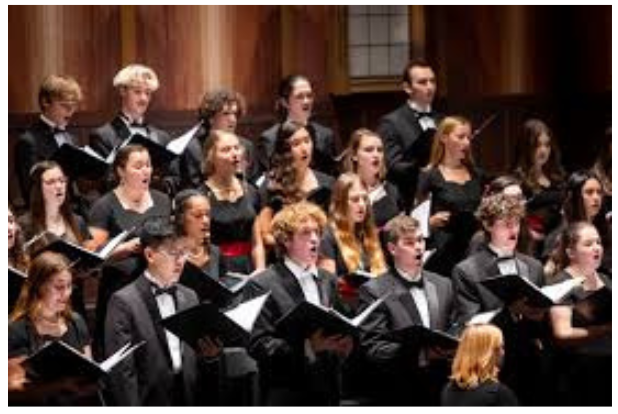
CT High School Scholarships for Choral Students
How to Understand How Important Choral Scholarships Are
Choral scholarships shape the lives of young musicians in big ways. To help students follow their love for music, they offer financial aid that can reduce the cost of tuition. Extra perks also include the chance to work with a mentor and attend special workshops with these scholarships.
Why should you apply for choral scholarships at a CT high school?
Applying for CT high school scholarships for choral groups can greatly alter a student’s future. Not only do such awards bring some money, but they also open up doors when it comes to college entrance. Schools are often looking for well-rounded people with dedication and competency in extracurricular activities, specifically arts-related.
Also, singing in a choir helps you develop useful skills like creativity, focus, and working together as a team. As students work together, they make friends that last a lifetime and make their high school experience better. Students also learn how to work together toward shared goals when they sing in a choir, which is a skill that will help them in any future endeavour.
Different Kinds of Scholarships
There are a number of choral scholarships for high school kids in Connecticut. These can be put into a few different groups:
1. Scholarships based on performance
Scholarships based on merit examine the quality and how often a student performs music. Mostly, such grants require that one demonstrates their ability to sing well by auditioning. These accolades are possibly awarded by communities such as music foundations and neighbourhood schools. An example of how this may take place is for the students to be part of an audition process with the Connecticut All-State Chorus, where winning the spot in the chorus might help improve performance and consequently give them a chance at some scholarships.
2. Scholarships Based on Need
Students who can show they need the money can get need-based grants. These awards are meant to help talented people who might not be able to pay for music lessons otherwise. Applicants usually have to show proof of their finances in order to be considered. Many community groups understand the importance of helping talented people grow, and they work to ensure that a student’s lack of money does not stop them from reaching their full potential.
3. Scholarships for communities and schools
There are several schools and other organizations in the region that administer their own choral scholarships. Mostly, these tend to be bestowed upon students who have participated in their school music programs. There is a high likelihood of scoring these grants through participation in activities within the local community. This may even come in the form of partnerships that exist between some schools and area businesses that sponsor music students to attend school upon good academic performances.
Searching for Choral Scholarships in Connecticut High Schools
There are several steps to take in order to find the best CT high school choir scholarships:
1. Do online research
If you need help finding scholarships, school teachers can be very helpful. They can help students with the application process and often know about area awards. Also, counsellors can help students figure out how to balance their singing and academic obligations so that they stay competitive in both.
3. Make connections with music teachers
Most music teachers know about choral scholarships and can inform you of future auditions and deadlines for applications. For many reasons, getting to know teachers can lead to new possibilities. In addition, teachers can give specific advice to each student about which scholarships are the best fit for him or her according to goals and skills.
Getting an Excellent Application Ready
A well-written application can help students stand out from other applicants. Here are some suggestions on how to make an interesting application:
1. Showcase your musical skills
Highlight the important achievements in the field of music. Give information regarding participation in any choir, competition, or even show. These shows depict one’s dedication to love choir music. One could compile a portfolio recording events or key projects that will be exhibited for proof. It shows dedication.
2. A statement of yourself.
In a personal statement, students can share what drives them and their aspirations. For instance, scholarship boards are often interested in a candidate’s journey in music and its transformative impact. Moreover, students should explain how the grant will help them achieve their goals in music and other areas of their lives.
Additionally, personal anecdotes can illustrate challenges faced and lessons learned, providing insight into their commitment. Ultimately, a focused personal statement highlighting these elements can significantly strengthen a student’s application, showcasing their dedication and potential for success.
3. Ask for strong suggestions
Letters of recommendation from choir directors or music teachers can also enhance applications. Such recommendations speak to the student’s character, hard work, and talent. The recommenders should be those who know the student well and can talk about his or her character and artistic skills.
How to Do Well in Auditions for Choral Scholarships
In Connecticut, many choral grants for high school students require auditions. Preparing properly will really pay off:
1. Selecting Appropriate Repertoire
Select pieces that display your sound and vocal range. Pick out music that best expresses your skills and elicits an emotion from you. Ideally, pick a range of music that reflects your technical as well as your creative ability.
2. Do this frequently
To gain trust, you need to practice regularly. It can help to calm down and do better when you practice in front of family or friends. Students could also record their practice lessons to look back at them and see what they could do better.
3. Pay attention to the presentation
Presentation is very important when trying out. Wear the right clothes, look someone in the eye, and use your body and face to show emotion. Students should remember that an audition isn’t just about singing; it’s also about making a mark on the judges and connecting with them.
What role does community involvement play?
Being part of the community helps support a student’s case if he or she is applying for choral scholarships. Joining the community choirs or charity acts in your place shows how you care for the arts and make a difference in the world.
1. Volunteering opportunities
Helping out with local music programs or arts groups as a volunteer can give you useful experience and help you meet new people. They can learn about the music business and make connections that could lead to scholarship applications.
2. Work together with others
Work on projects with other artists and help them to work together and be more creative. When people work together, they often find new possibilities like putting on shows with each other or going to workshops which may help them improve on their skills.
Conclusion
In a nutshell, CT high school choral grants are a great way for aspiring musicians to get help. Students can increase their chances of getting financial aid by learning about the different types of scholarships out there, doing thorough research, and putting together good applications. Not only do these grants help with money, but they also help people grow as people and as artists.
As the students go through high school, they should seize the opportunities that will allow them to pursue their passion for choral music with passion and dedication. The journey will be challenging, but the rewards are worth the cost personally and financially. The student will improve his future and contribute to the music world if he dedicates his time and effort to the skill.























Post Comment